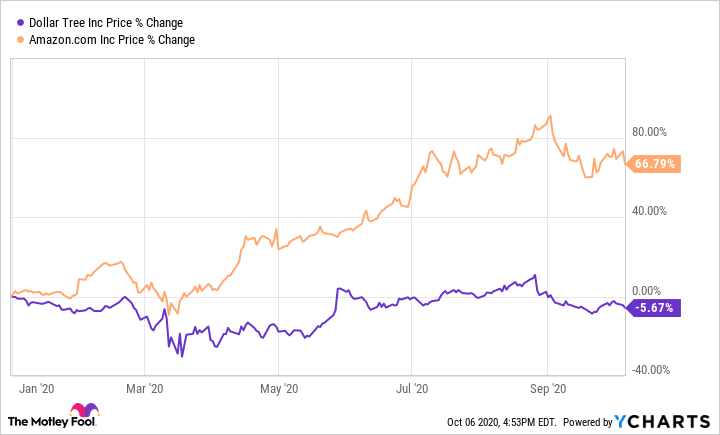Amazon (AMZN -1.64%) and Dollar Tree (DLTR -0.14%) take different approaches to reach customers looking for bargains. Amazon targets customers looking for a wide array of merchandise online. Conversely, Dollar Tree is an ultra-discounter offering items at low price points.
Nonetheless, cheapness is not always a priority for investors. They care about which retail stock will generate the most returns for them going forward. Let's see which retailer offers more profit potential under current conditions.
Comparing the businesses
Although both companies are in the "discount" business, investors need to note the stark differences between the two retailers. Amazon helped pioneer online commerce, and it has grown to become the largest e-commerce entity, doing business on six continents primarily through this medium.
In contrast, Dollar Tree reaches customers in the U.S. and Canada mostly through more than 15,000 Dollar Tree and Family Dollar stores. In Dollar Tree's case, most items sell at the $1 price point, although Family Dollar also sells low-cost merchandise.
Amazon further differentiates itself by running a cloud computing business called Amazon Web Services (AWS). This has given the company the distinction of becoming a retailer that derives most of its profits outside of retail.

Image source: Getty Images.
Contrasting the numbers
From a size perspective, the two companies do not compare well. Amazon supports a market cap of more than $1.5 trillion. At a market cap of around $21 billion, Dollar Tree is less than 1.5% of Amazon's size. Moreover, Amazon's stock has risen by almost 67% year to date. Dollar Tree has fallen by about 6% over the same period.
Not only is Amazon a larger company, but its stock also sells at a higher premium. Amazon trades at a forward P/E ratio above 61, while Dollar Tree sells for around 15 times forward earnings.
Dollar Tree's quarter ended one month after Amazon's. Hence, the latest-quarter financials are not an exact comparison. Nonetheless, Amazon's net sales increased by 40% from the year-ago quarter. This is far ahead of Dollar Tree, which increased its net sales by just over 9%.
However, the profit picture is a matter of perspective. In the most recent quarter, Amazon increased its diluted earnings per share by around 97% compared to the same quarter last year. Looking forward, analysts forecast overall earnings will grow by almost 38% this year, and by about 40% in fiscal 2021.
For its most recent quarter, Dollar Tree saw its diluted earnings per share rise by about 45%. Interestingly, Amazon's operating income rose by around 37%, meaning Dollar Tree outperformed the online giant in North America. Still, Amazon posted higher growth numbers overall.
Looking forward, analysts predict about a 10% profit increase for Dollar Tree in the current fiscal year, and around 11% the following year.
When comparing the retailers to one another, most of the valuation and profit metrics point to clear differences in the performance of each company.
| Financial Metric | Amazon | Dollar Tree |
|---|---|---|
| Stock price growth year to date | 69% | (4%) |
| Forward P/E ratio | 61 | 15 |
| Diluted EPS growth: most recent quarter | 97% | 45% |
| Growth in net sales: North America | 37% | 45% |
| Projected earnings growth: current fiscal year | 38% | 10% |
Data sources: Amazon investor relations, Dollar Tree investor relations, Morningstar.
Amazon or Dollar Tree?
Despite Dollar Tree's lower P/E ratio and better performance in North America, I have to go with Amazon.
For one, Dollar Tree's long-term potential for expansion is unclear. Although Dollar Tree is likely coming close to saturation in its home market, it has shown no obvious interest in opening in other countries besides Canada. This leaves it heavily reliant on same-store sales to drive growth.
Moreover, retail remains a low-margin business. Amazon addresses this by turning to the cloud for its earnings growth. Dollar Tree, like most other retailers, has no such core competency. I do not suggest that Dollar Tree attempt any non-retail ventures. Still, having a high-margin business to drive increased profits is an undeniable advantage.
Both companies should continue to earn higher sales and rising profits for shareholders over time. Nonetheless, while a slower economy might presumably help the growth prospects of Dollar Tree, Amazon's ability to drive earnings increases in any economy gives its stock more potential for gains.






